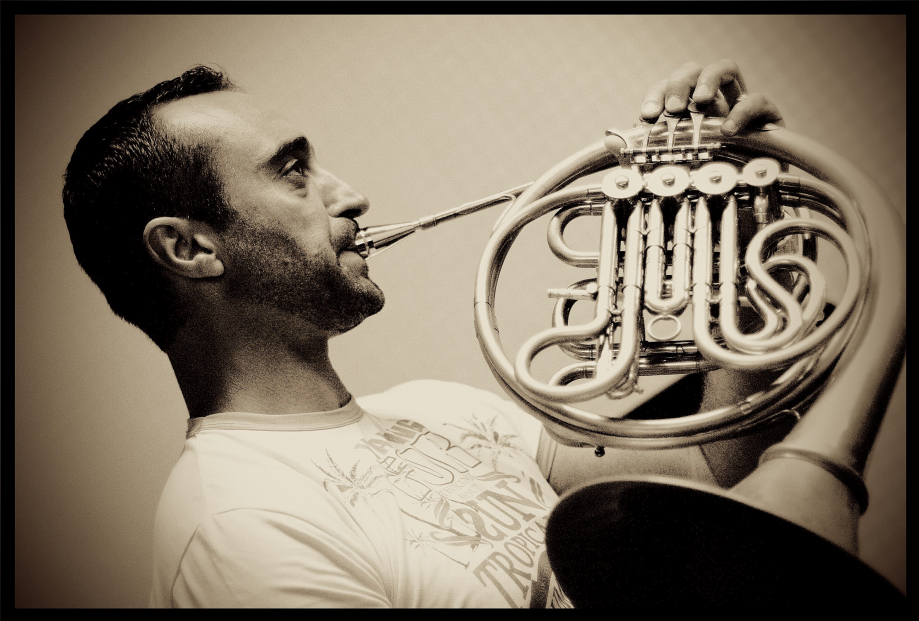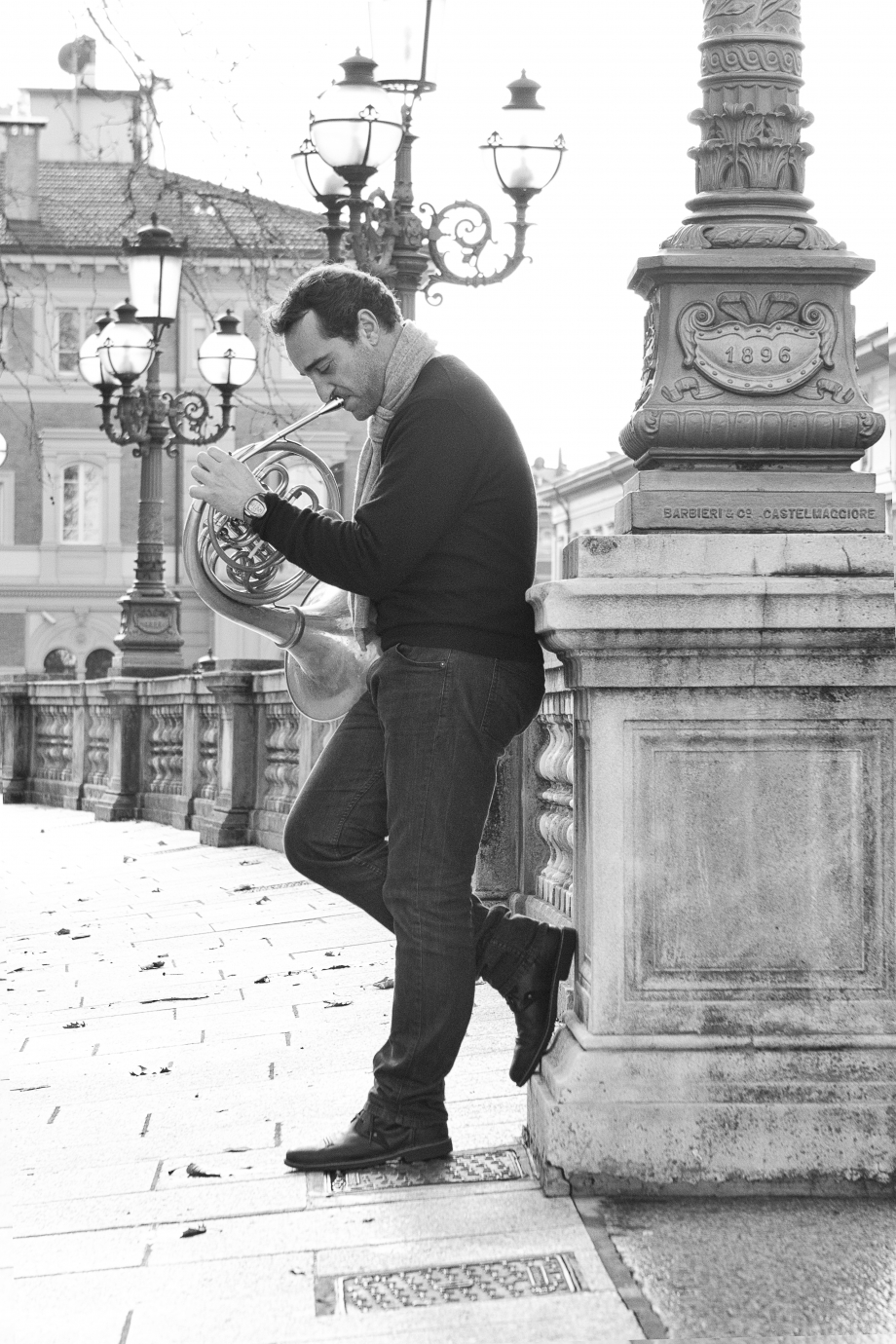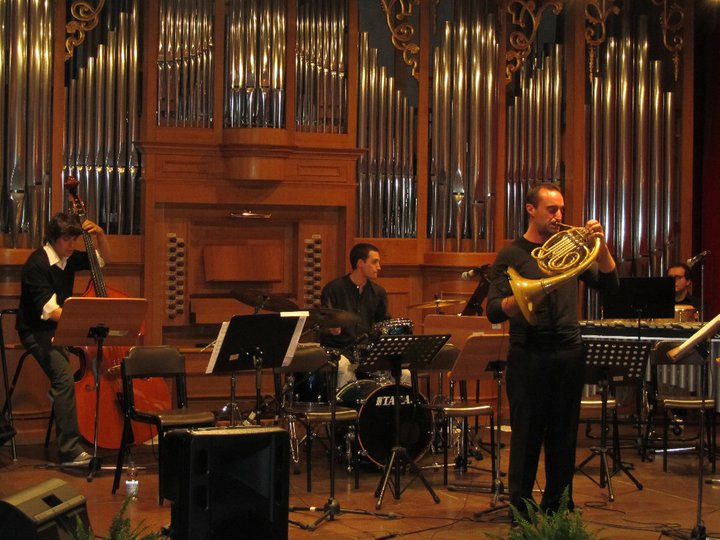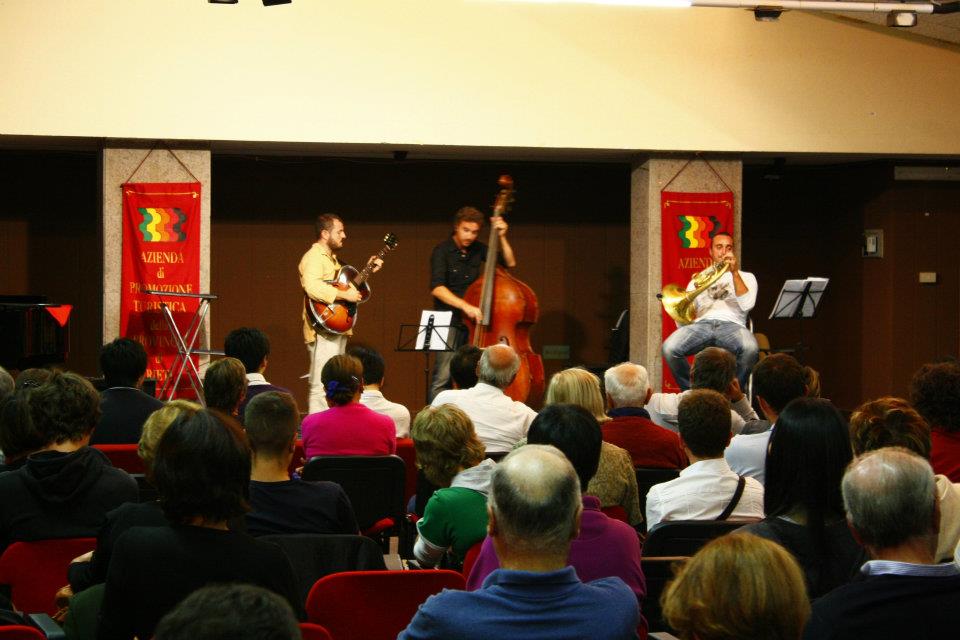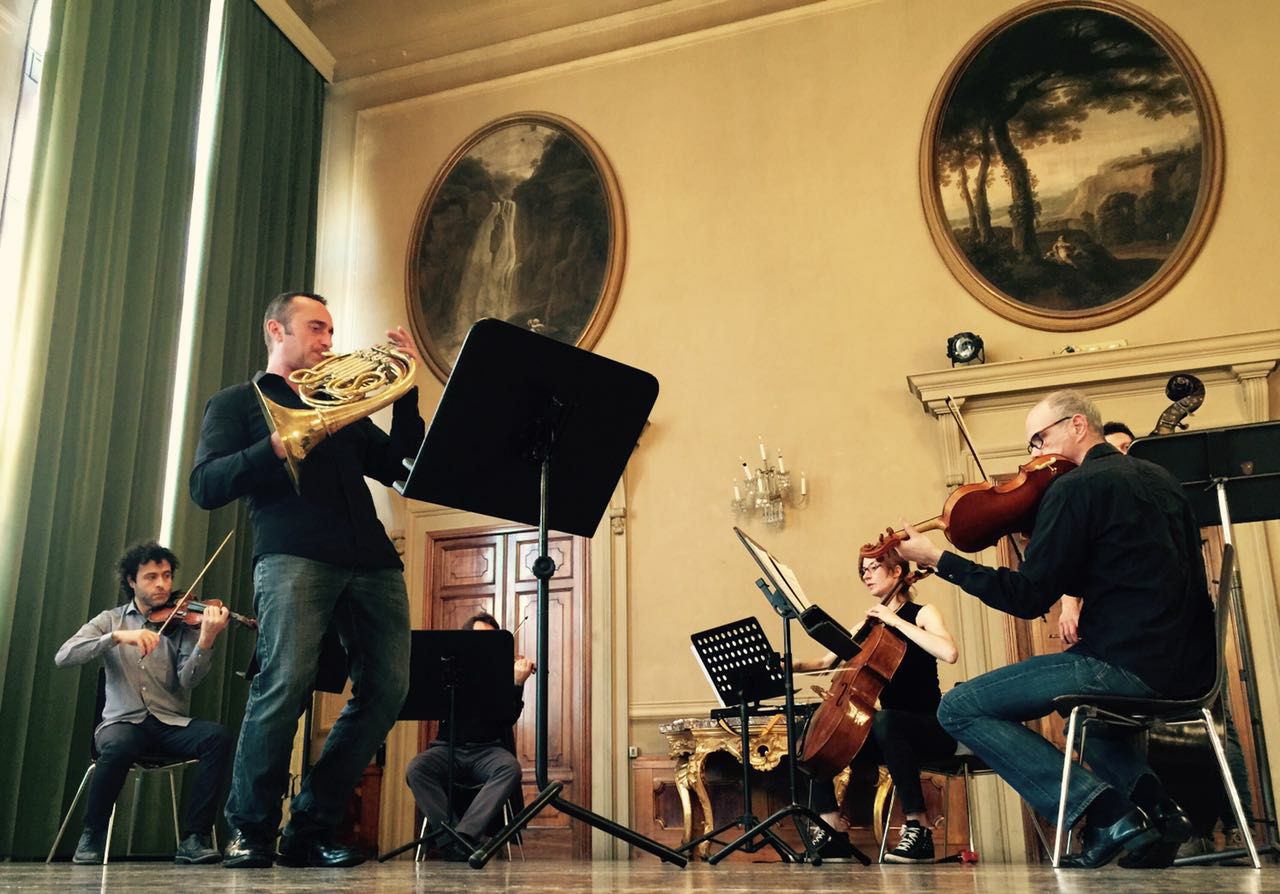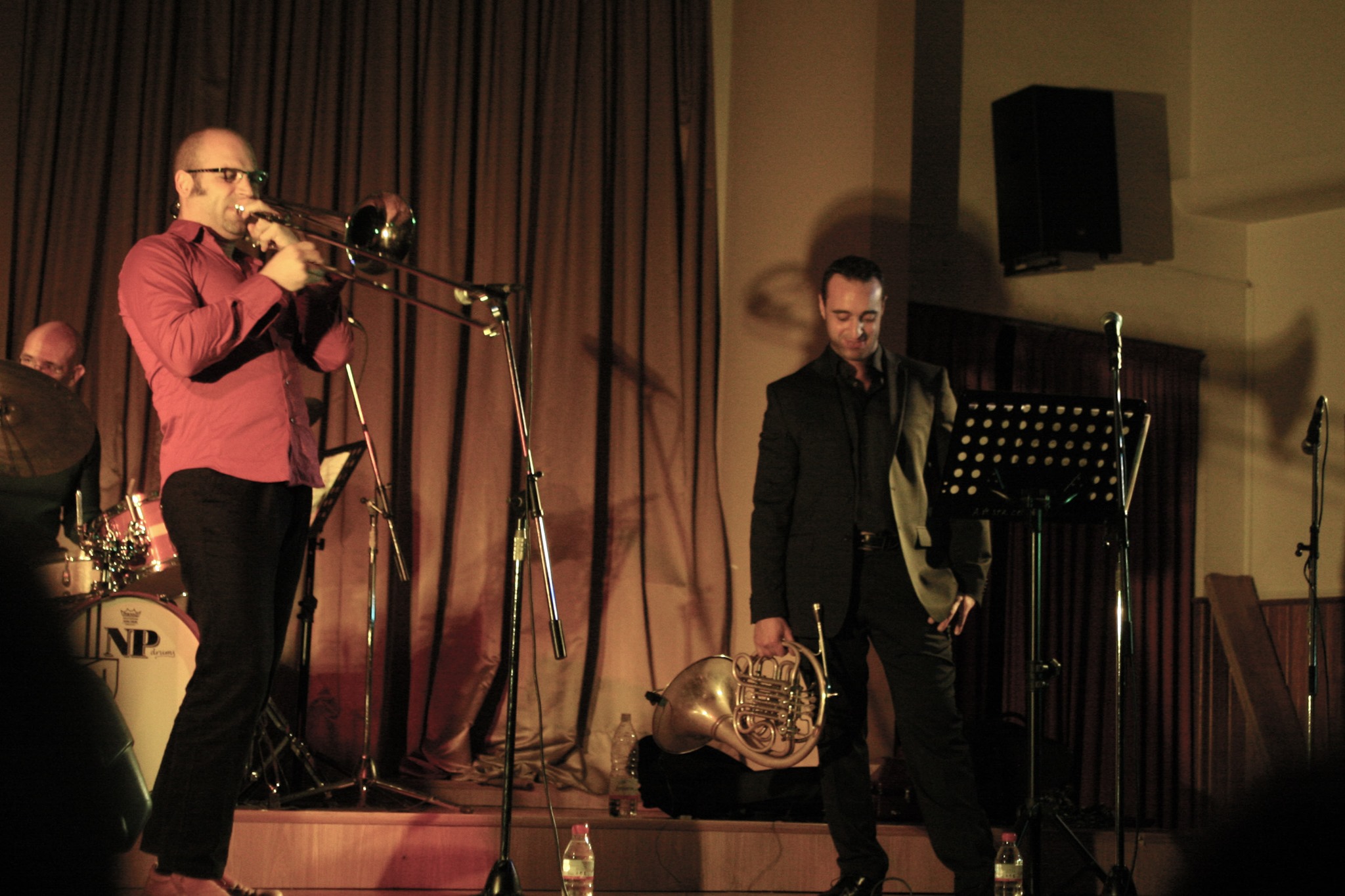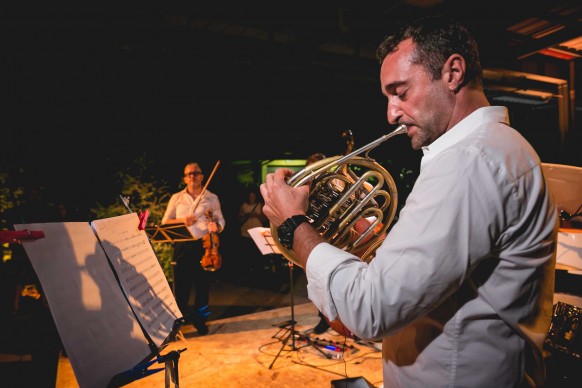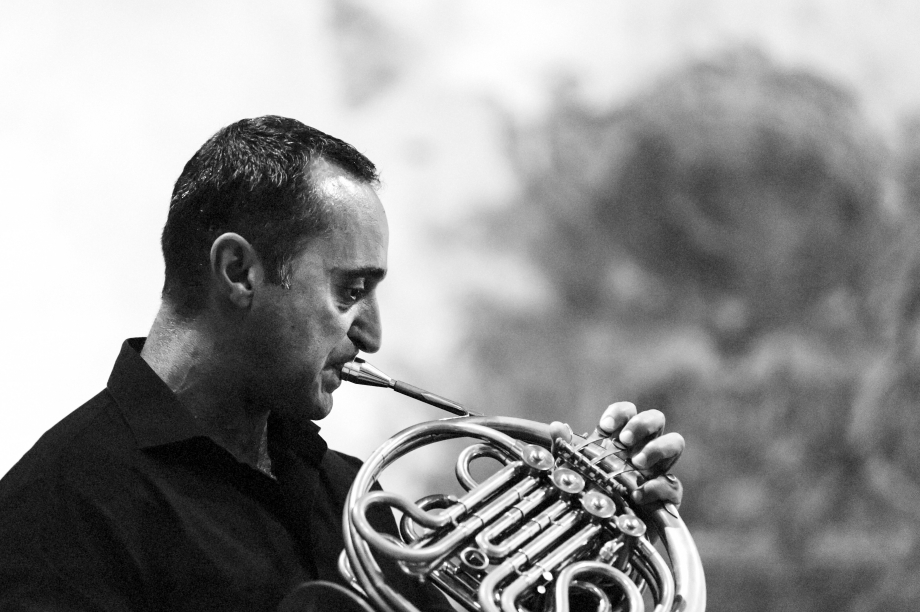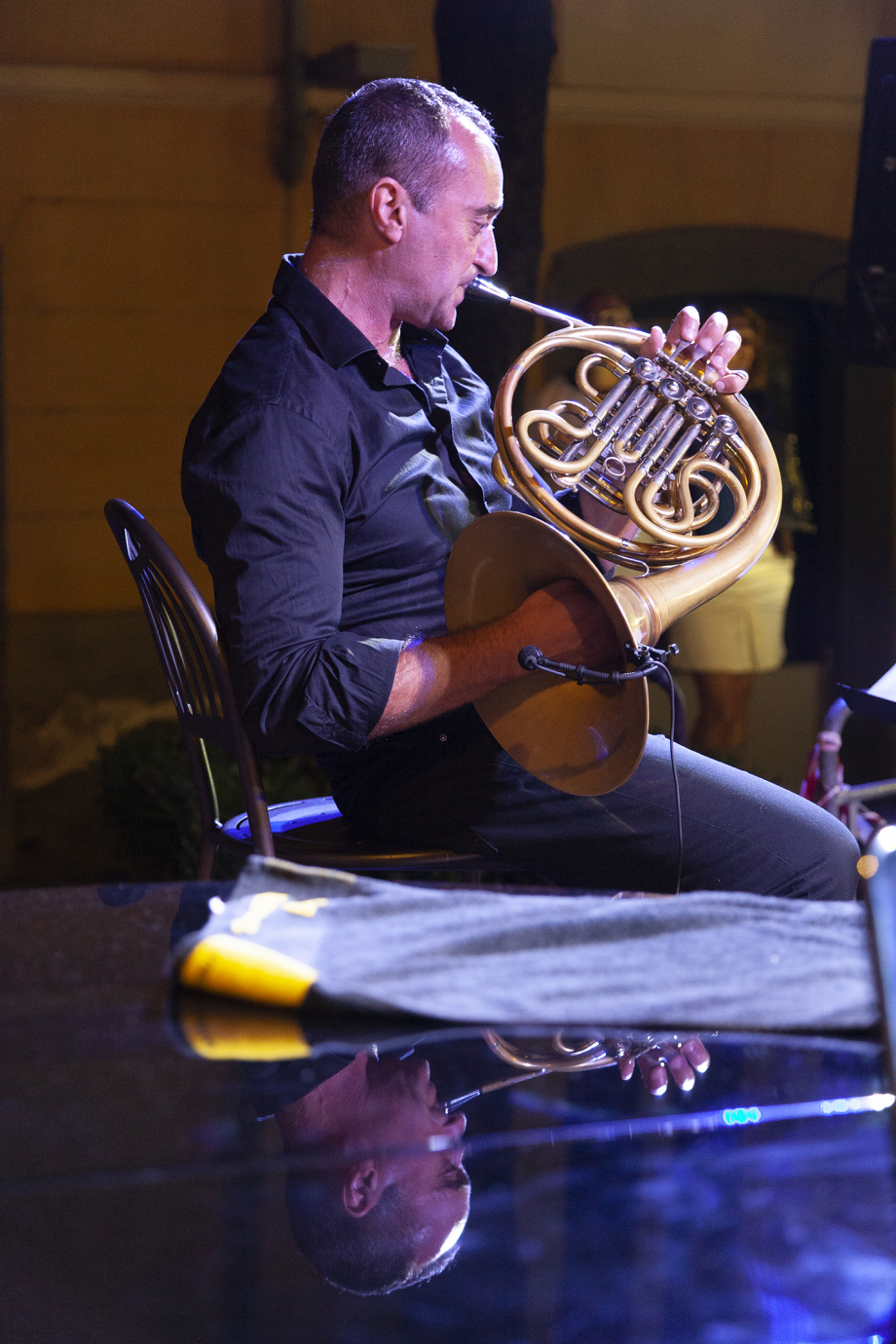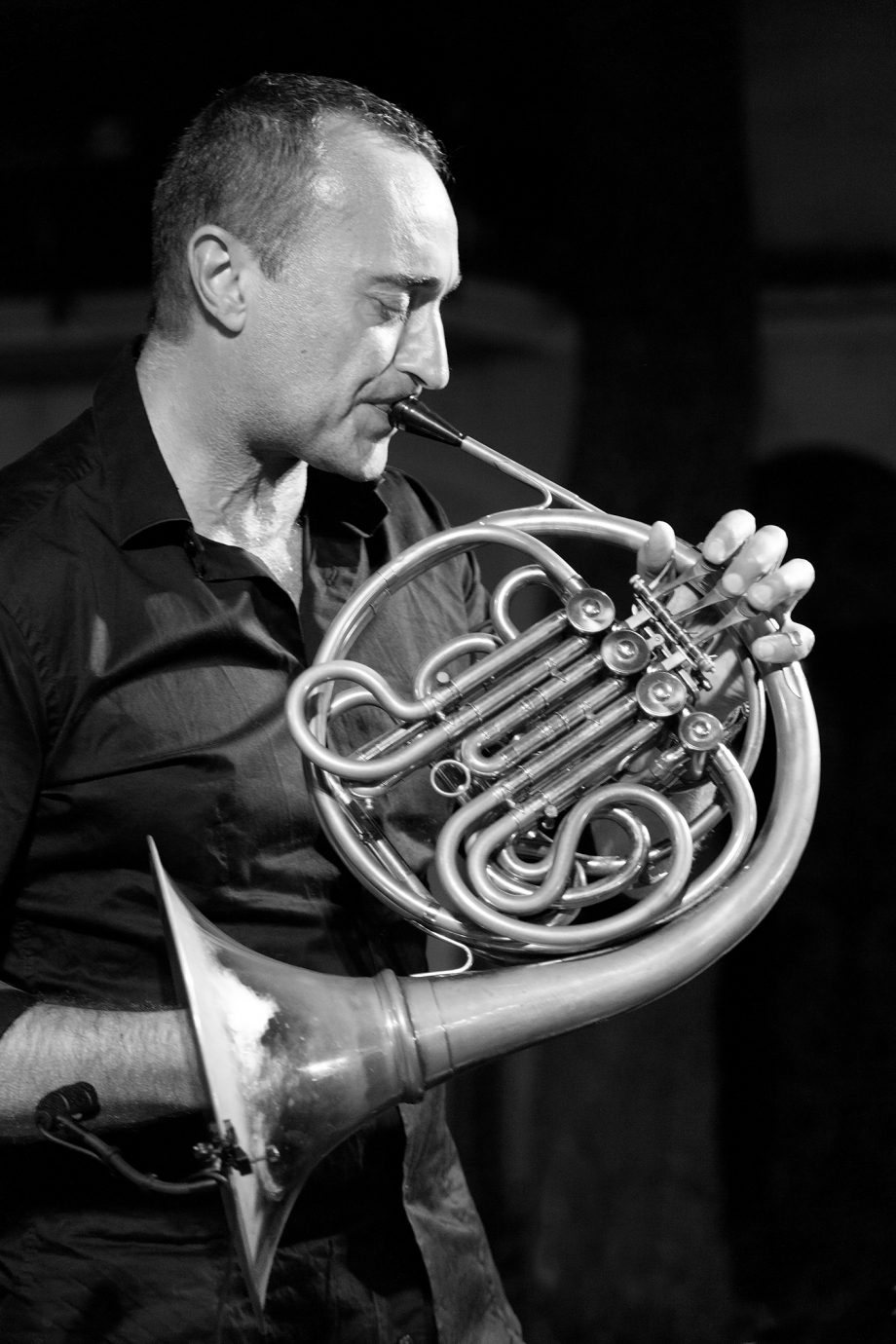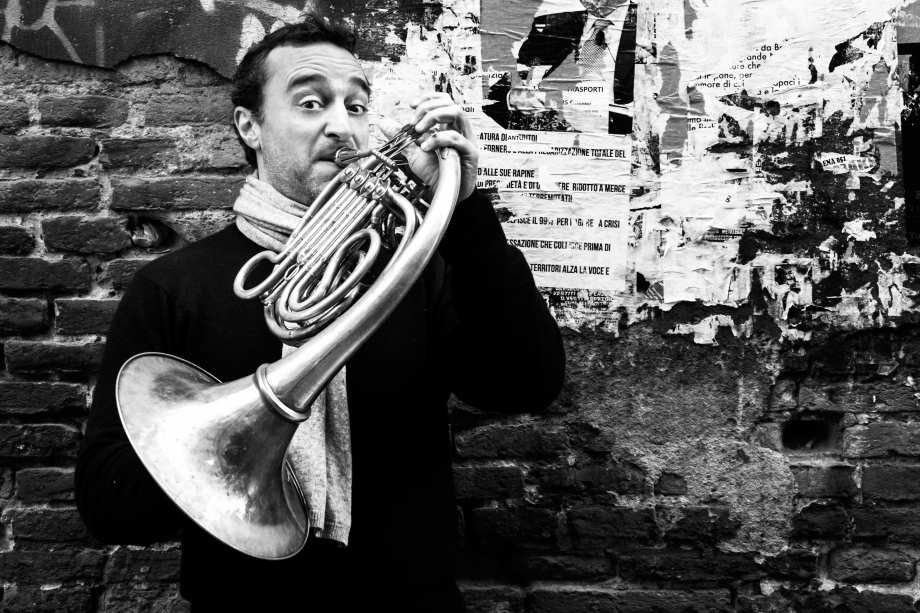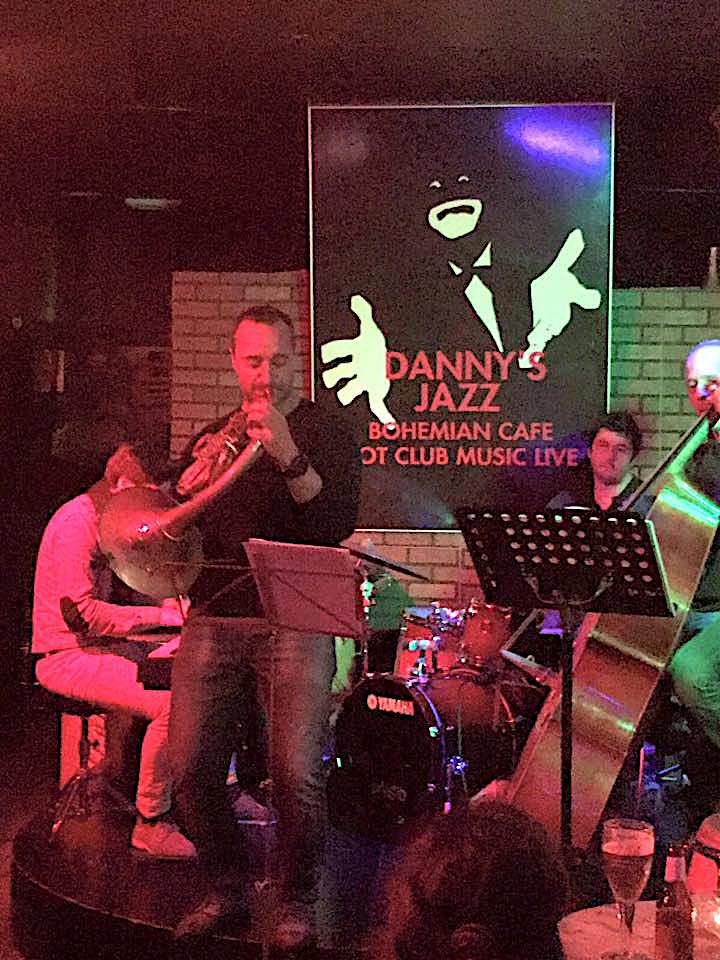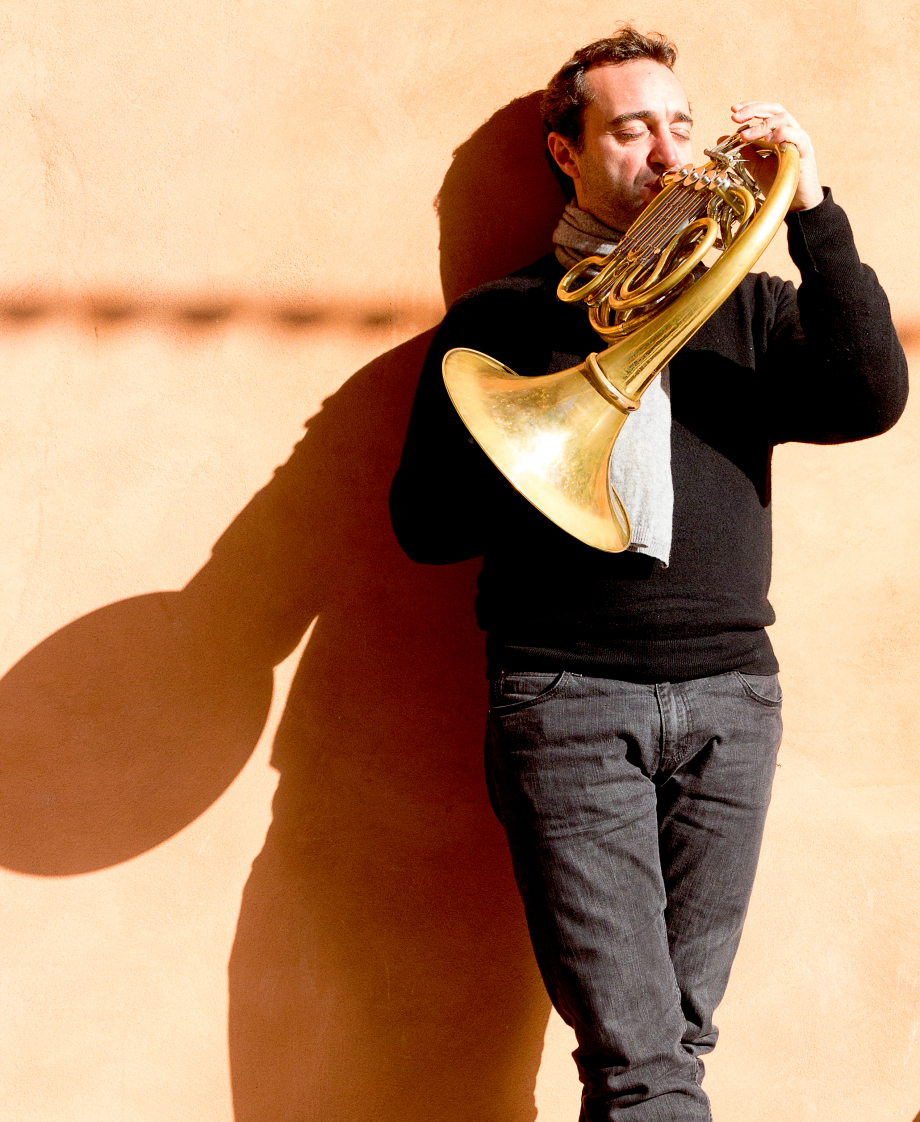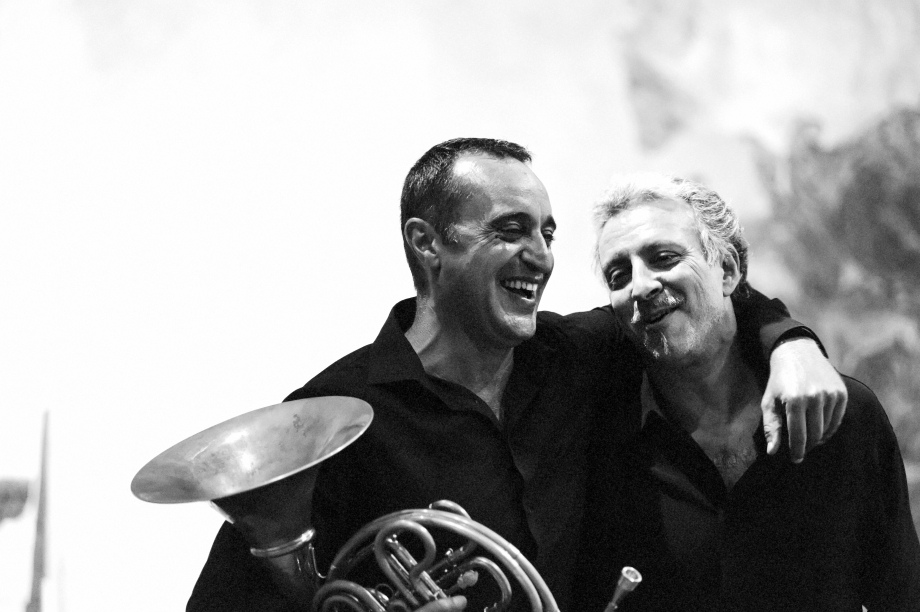GIOVANNI HOFFER
GIOVANNI HOFFER
ITALIANO
ENGLISH
FRANÇAIS
ITALIANO
Carissimo Giovanni, ti ho conosciuto all'inizio degli anni 2000 quando venivi presso la Sinfonica Toscanini di Lorin Maazel come terzo corno oppure come assistente primo, sempre con grande talento, ma non ricordo che già suonasse jazz, era così?
Proprio in quegli anni cominciava la mia avventura con il Jazz, ho sempre amato diversi generi musicali, rock, jazz, funky, etc e quando ne ho avuto la possibilità ho cominciato ad affrontarli seriamente, senza sapere se ci sarei riuscito vista anche la particolarità dello strumento. È stato un ottimo stimolo anche per tenermi in forma dovendo applicarmi tecnicamente su linguaggi nuovi e dovendo superare difficoltà tecniche inaspettate.
Avere un background come musicista classico è sempre un "più" quando ti lanci in una improvvisazione, invece che valore aggiunto artistico porti al Teatro comunale di Bologna facendo anche jazz?
Personalmente ho cominciato ad ascoltare la musica classica, magari mentre sono in orchestra, con un'attenzione differente, dal punto di vista armonico e strutturale del brano e questo è sicuramente d'aiuto nel lavoro d'equipe. Tra i colleghi trovo molti consensi e capita che qualcuno mi chieda come affrontare un solo magari del repertorio del 900.
In teatro sta anche nascendo un gruppo di ottoni e percussioni con l'obiettivo di affrontare un repertorio diverso, non classico, tra jazz pop e funky, abbiamo registrato qualche video durante il primo lockdown ed è stato molto interessante vedere come musicisti prettamente classici si potessero avvicinare con entusiasmo ad un linguaggio completamente nuovo che obbliga ad utilizzare parametri distanti da quella che è la prassi esecutiva accademica.
C'è un modo diverso di studiare lo strumento che sia per la disciplina classica che quella dedicata al jazz, oppure si tratta sempre di suonare il corno?
Il corno è sempre il corno,certo che gli aspetti su quali concentrarsi mentre si studia jazz sono differenti, non parlo solo dell'armonia e dell'improvvisazione ma in particolare dello studio della flessibilità, dell'articolazione e della resistenza.
Spesso in un concerto jazz mi capita di suonare anche due ore di fila in duo con il pianista, perchè i soli siano fluidi occorre avere una buona flessibilità anche alla fine del concerto e questo comporta un consapevole lavoro muscolare,oltre alla padronanza della struttura armonica che mi permetta di essere rilassato e di concentrarmi esclusivamente sul dialogo con gli altri musicisti. Improvvisare è a tutti gli effetti una composizione estemporanea e per poter lasciare fluire le idee musicali in libertà occorre avere il miglior feeling possibile con lo strumento, essere soddisfatti del suono e non essere preoccupati che un brano sia troppo veloce o un tema troppo pesante. Il mio studio ha sempre una buona parte di tecnica sui suoni armonici e sulla flessibilità, non molto distante da quando ho preparato i concorsi per orchestra.
Ho notato che usi a volte un corno triplo in orchestra, invece suoni sempre il jazz con un corno doppio. Non sarà solo per il peso minore, ci spieghi il motivo?
Il corno triplo che suono in orchestra (che tu conosci forse meglio di tutti) mi permette di raggiungere sonorità molto delicate e mi toglie molto stress in particolare nel registro acuto, dove suonando molta Opera, spesso l'obiettivo è "non disturbare".
Per il Jazz preferisco il corno doppio, lo trovo più immediato, più agile anche per la posizione della mano sinistra.
Tra di noi, diciamoci la verità: se il mondo jazz pagasse meglio, avresti la voglia di fare solo quello, oppure trovi nell'ambivalenza attuale un perfetto equilibrio?
Credo che l'orchestra alla lunga mi mancherebbe, il contatto con il suono totalmente acustico per esempio o la possibilità di vivere in prima persona la messa in scena di capolavori assoluti, di recente ho suonato "Tristan e Isolda" e l'ispirazione che ho trovato dall'utilizzo dell'armonia in Wagner e nella magia di alcuni accostamenti timbrici per me sono ancora linfa vitale e fonte di ispirazione, poi si vedrà!
La vita mi ha riservato molte sorprese e mi lascio sorprendere!
Ci sono tanti cornisti "classici" di grande talento che ci aiutano a sviluppare la nostra creatività. Nel corno-jazz, non ci sono tanti esempi da seguire, quindi come riesci a fare o creare quello non ancora avvenuto?
Dal mio punto di vista lo studio del jazz è una forma di meditazione, è un modo per scoprire se stessi. Quando mi sento "centrato" spesso scopro cose nuove ed allora me le appunto e cerco di approfondirle, rimanendovi attaccato. Bisogna dire che il linguaggio jazz è molto più trasversale, spesso l'ispirazione arriva da altri musicisti e non per forza cornisti.
C'è uno strumento maggiormente che spesso cerchi di imitare?
Più che imitare cerco di imparare ed assimilare delle idee, più che uno strumento cerco di imparare dai grandi musicisti, John Coltrane, Chet Baker, Miles Davis etc... etc... per citarne tre "a caso". Certo che aver ascoltato molto il trombonista Frank Rosolino mi ha aiutato in termini di linguaggio, e non solo.
Come essere umani abbiamo dei limiti, in un momento della vita, perdiamo sicuramente le nostre qualità. È lo stesso nel mondo del jazz oppure c'è lo spazio per chi impara ogni giorno nuovi modi per improvvisare? Penso particolarmente a Chet Baker e Miles Davis.
Di sicuro i musicisti jazz sono più longevi come artisti, spesso la perdita di freschezza tecnica viene supplita con la profondità e la bellezza delle frasi, io credo che il vero musicista jazz sia un eterno studente, sempre alla ricerca di qualcosa, e lo si percepisce dagli stessi musicisti e dai loro discorsi. È fisiologico che il corpo invecchia, ma la mente diventa molto più potente!
Da anni, apprezzo oltre te, Julius Watkins, Sharon Freeman, Tom Warner, Tom Bacon, David Amram, Claudio Pontiggia, Arkady Shilkloper, ma purtroppo la lista è così corta anche se ne dimentico qualcuno... Come spieghi che non ci siano più cornisti jazz in tutto il mondo?
Ci ho pensato molte volte, credo che il problema sia la pressione sonora del corno, sicuramente inferiore ad un Sax o una tromba. Il jazz alle origini era perlopiù acustico e se mettiamo un corno vicino ad una batteria ed un sax è difficile che possa esprimersi al meglio, con agilità e sfruttando l'intera gamma di colori. Questo ha fatto sì che non si creasse una tradizione ampia del corno jazz, inoltre è sicuramente più difficile articolare con chiarezza o raggiungere l'agilità di un sax per esempio. Per fortuna i tempi ora sono cambiati, la lista si sta allungando sempre più e si scoprono quotidianamente nuovi talenti, l'interesse intorno a questo "nuovo" mondo è sempre più ampio e io ne sono davvero felice ma, purtroppo, ha generato anche molti improvvisatori (nel senso che si improvvisano senza aver approfondito adeguatamente la materia), perdonami la nota amara e il gioco di parole ma, per me, il jazz è una cosa seria che richiede molto studio, molta sensibilità musicale e soprattutto umiltà.
Insegnare presto il jazz a cornisti giovani può essere utile, oppure meglio aspettare di aver una tecnica solida?
Il jazz è un modo di pensare, un approccio totalmente diverso alla musica, io mi diverto molto con i giovani e i giovanissimi,hanno la mente libera e quindi più ricettiva. Per quello che mi riguarda credo sarebbe utile se fosse materia obbligatoria per tutti gli strumenti, a partire da subito.
Il grande violinista jazz Didier Lockwood crea una scuola di musica dove si suona anche senza partitura, e si imparano ritmi africani. Pensi che ci sarebbero dei progressi da fare nel modo in cui normalmente la musica viene insegnata?
Assolutamente sì, spesso si perde di vista l'aspetto primordiale della musica, che prima è nata e solo in seguito è stata codificata in una scrittura, suonare ed imparare ad orecchio, ad istinto, è per me importantissimo e il rapporto con i ritmi tribali dovrebbe essere coltivato e stimolato, risolverebbe la maggior parte dei problemi di Interplay dei futuri musicisti professionisti. Non dimentichiamoci poi che il corno è uno strumento tribale, vorrebbe dire ritrovare anche le nostre origini.
Ci spieghi l’importanza degli incontri nel jazz tipo un artista ti fa suonare diversamente? Chi vorresti incontrare con cui non hai ancora suonato?
Il jazz è basato sul dialogo fra i musicisti, l'incontro è tutto,proprio come concetto filosofico, se poi hai la fortuna di incontrare un musicista illuminato, più o meno famoso,questo non ha molta importanza, non puoi far altro che apprendere e "sentire la sua energia", non ho un musicista in particolare che vorrei incontrare, sarebbero così tanti!
Spero però un giorno di incontrare chi mi possa portare ad un livello superiore, mi dia la capacità di comunicare al meglio ed essere sintetico, insomma di dire solo le cose interessanti e quindi suonare solo le note che cantano!
CODA: Ha senso democratizzare la pratica del corno sempre di più, tra professionisti ma anche amatori, o dovremo piuttosto concentrarci su qualche elemento eccezionale che ci farà sognare tutti?
La musica non sta passando un ottimo periodo, lo vediamo anche dagli atteggiamenti irresponsabili di alcuni governi nei confronti della cultura in generale. Credo che, se suonare uno strumento fosse una pratica diffusa, anche solo per personale divertimento, vivremmo in un mondo migliore, saremmo più apprezzati come professionisti e potremmo scoprire nuovi e giovani talenti che ci faranno sognare!
P.S.: volevo ringraziarti molto per questa intervista, in particolare per avermi dato la possibilità di parlare di ciò che amo e che credo possa essere di stimolo per tanti giovani cornisti, aiutandoli ad affrontare la professione con più competenze e preparazione.
Non tutti i professionisti accolgono ancora il corno jazz con entusiasmo o rispetto, solo i veri musicisti sensibili ed attenti, come tu sei,riescono a liberarsi dai preconcetti e ad apprezzare anche l'altra metà del cielo!
GIOVANNI HOFFER DICEMBRE 2020
----------
ENGLISH
Dearest Giovanni, I met you in the early 2000s when you joined us at the Sinfonica Toscanini Orchestra led by Lorin Maazel as third horn or as bumper, always with great talent, but I don’t think you were already playing jazz, was it so?
Just in those years began my adventure with Jazz, I always loved different musical genres, rock, jazz, funky, etc and when I had the chance I began to face them seriously, without knowing if I could see even the particularity of the instrument. It was an excellent stimulus also to keep in shape, having to apply myself technically in new languages and having to overcome unexpected technical difficulties too.
Having a background as a classical musician is always a "plus" when you throw yourself into an improvisation. What kind of artistic added value are you bringing to the Teatro comunale di Bologna as a jazz player?
Personally I started to listen to classical music in a different way, when I am in the orchestra, I have a different attention from the harmonic and structural point of view of the piece, and this is certainly helpful in our section. Among colleagues I find many consensus and it happens that someone asks me how to deal with a single maybe of the repertoire of the 900. In the theater is also being born a group of brass and percussion with the aim of dealing with a different repertoire, not classic, between jazz, pop and funky. We recorded some videos during the first lockdown and it was very interesting to see how classical musicians could approach with enthusiasm to a completely new language that forces to use parameters distant from what is the practice academic of an executive.
Is there a different way to study the instrument in both "classical" and "jazz" disciplines, or is it always about playing the horn?
The horn is always the horn, of course the aspects to focus on while studying jazz are different, I’m not just talking about harmony and improvisation but in particular the study of flexibility, articulation and stamina. Often in a jazz concert I happen to play even two hours in a row in duo with the pianist, because the solos are fluid you need to have a good flexibility at the end of the concert and this involves a conscious muscle work, in addition to the mastery of the harmonic structure that allows me to be relaxed and to focus exclusively on dialogue with other musicians.
Improvising is in effect an impromptu composition and in order to allow musical ideas to flow freely, the best possible feeling with the instrument is required, one should be satisfied with the sound and do not be worried that a song is too fast or a theme too heavy. My practicing always has a good part of harmonics and flexibility, not far from when I prepared the orchestra auditions.
I noticed that you sometimes use a triple horn in the orchestra, but you always play jazz with a double horn. This is certainly not just for the minor weight, can you explain it?
The triple I am playing in orchestra (that you know perhaps best of all) allows me to reach very delicate notes and takes away a lot of stress especially in the high register, where playing a lot of Operas, often the goal is to "not disturb".
For the Jazz I prefer the double horn, I find it more immediate, more agile also for the position of the left hand.
Between us, tell me the truth: if the jazz world could be paid better, would you want to do just that, or do you find in the current ambivalence a perfect balance?
I think I would miss the orchestra in the long term, the contact with the totally acoustic sound for example or the possibility of experiencing firsthand the staging of absolute masterpieces, I recently played "Tristan" and the inspiration I found from the use of harmony in Wagner and in the magic of some tonal combinations for me are still lifeblood and source of inspiration.
Then you will see!
Life has given me many surprises and I let myself be surprised!
There are many top "classic" horn players that help us to develop our creativity. In the horn-jazz world, there aren’t many examples to follow, so how do you create something that hasn’t happened yet?
From my point of view the study of jazz is a form of meditation, it is a way to discover yourself. When I feel "centered" I often discover new things and then I note them and try to deepen them, remaining attached. It must be said that the jazz language is much more transversal, often the inspiration comes from other musicians and not necessarily framers.
Is there an instrument that you often try to imitate?
More than imitating I try to learn and assimilate ideas, more than an instrument I try to learn from the great musicians, John Coltrane, Chet Baker, Miles Davis etc... etc... to name three "at random". Of course listening to trombonist Frank Rosolino helped me in terms of language, and not only that.
As human beings we have limits, at a time in life, we surely lose qualities. Is it the same in the world of jazz or is there room for those who learn new ways to improvise every day? I am thinking particularly of Chet Baker and Miles Davis.
For sure jazz musicians are more long-lived as artists, often the loss of technical freshness is compensated with the depth and beauty of the phrases, I believe that the true jazz musician is an eternal student, always looking for something, and it is perceived by the musicians themselves and their speeches. It’s physiological that the body ages, but the mind becomes much more powerful!
For years, I have appreciated besides you, Julius Watkins, Sharon Freeman, Tom Warner, Tom Bacon, David Amram, Claudio Pontiggia, Arkady Shilkloper, but unfortunately the list is so short, even if maybe I forget some others... How do you explain that there are no more jazz framers in the world?
I’ve thought about it many times, I think the problem is the sound pressure of the horn, definitely lower than a sax or a trumpet. Jazz at the beginning was mostly acoustic and if we put a horn next to a drum and a sax it is difficult to express it at its best, with agility and taking advantage of the whole range of colors. This did not create a broad jazz horn tradition, and it is certainly more difficult to articulate clearly or achieve the agility of a sax for example.
Luckily times have now changed, the list is getting longer and more and new talents are discovered every day, the interest around this "new" world is always wider and I’m really happy but unfortunately, has also generated many improvisers (in the sense that they improvise without having studied the subject properly), forgive me the bitter note and the pun but. For me jazz is a serious thing that requires a lot of study, a lot of musical sensitivity and above all humility.
Can teaching jazz to young hornists be useful, or better to wait for a solid technique?
Jazz is a way of thinking, a totally different approach to music, I have a lot of fun with young people and young people have a free mind and therefore can be more receptive. As far as I am concerned, I think it would be useful if it were a compulsory subject for all instruments, starting immediately.
The great jazz violinist Didier Lockwood creates a school of music where you can play without score, and learn African rhythms. Do you think there would be progress to be made in the way music is normally taught?
Absolutely yes, often you lose sight of the primordial aspect of music, which was first born and only later was encoded in a writing, play and learn by ear, by instinct, is very important to me and the relationship with tribal rhythms should be cultivated and stimulated, would solve most of the problems of Interplay of future professional musicians. Let’s not forget that the horn is a tribal instrument, it would mean rediscovering our origins.
Explain the importance of meetings in jazz like an artist makes you play differently ? Who would you like to meet that you haven’t played with yet ?
Jazz is based on the dialogue between the musicians, the meeting is everything, just as a philosophical concept, if you are lucky enough to meet an enlightened musician, more or less famous, this is not very important, you can only learn and "feel his energy", I don’t have a musician in particular that I would like to meet, they would be so many!
But one day I hope to meet someone who can take me to a higher level, gives me the ability to communicate at best and be synthetic, in short, to say only the interesting things and then play only the notes that sing!
CODA: does it make sense to democratize the practice of the horn more and more, between professionals but also amateurs, or should we rather focus on some exceptional element that will make us all dream?
Music is not going through a very good period, we also see it from the irresponsible attitudes of some governments towards culture in general. I think that if playing an instrument was a common practice, even for personal fun, we would live in a better world, we would be more appreciated as professionals and we could discover new and young talents that will make us dream!
Postscript: I wanted to thank you very much Hervé for this interview, in particular for giving me the opportunity to talk about what I love and that I think can be a stimulus for many young framers, helping them to face the profession with more skills and preparation. Not all professionals still welcome the jazz horn with enthusiasm or respect, only the real sensitive and attentive musicians, as you are, manage to free themselves from preconceptions and also appreciate the other half of the sky!
GIOVANNI HOFFER DECEMBER 2020
----------
FRANÇAIS
Mon cher Giovanni, je t'ai connu au début des années 2000 quand tu venais à la Symphonica Toscanini de Lorin Maazel comme troisième cor ou comme assistant premier, toujours avec beaucoup de talent, mais je ne me souviens que tu jouais déjà du jazz, qu'en était-il?
Au cours de ces années a commencé mon aventure avec le Jazz, j’ai toujours aimé les différents genres musicaux comme le rock, le jazz, le funk, etc. Ce fut aussi un excellent stimulant pour me maintenir en forme, devant m’appliquer techniquement sur de nouveaux langages et devant surmonter des difficultés techniques inattendues.
Avoir bagage en tant que musicien classique est toujours un "plus" quand tu te lance dans une improvisation, mais quelle valeur ajoutée (artistique) offres-tu au Théâtre Municipal de Bologne comme jazzman?
J’ai personnellement commencé à écouter la musique classique quand je suis à l'orchestre avec une attention différente. Du point de vue harmonique et structurel du morceau, cela est certainement utile dans le travail de pupitre. Parmi les collègues je trouve beaucoup de consensus et il arrive que quelqu’un me demande comment aborder un solo du répertoire du début du XXème siècle. Dans le théâtre est en train de naître un groupe de cuivres et percussions dans le but d’aborder un répertoire différent, non classique, entre jazz pop et funk, nous avons enregistré quelques vidéos pendant le premier lockdown et il était très intéressant de voir comment des musiciens purement classiques pouvaient s’affranchir avec enthousiasme d’un langage complètement nouveau, qui oblige à utiliser des paramètres éloignés de ce qu’est la pratique exécutif académique.
Y a-t-il une autre façon d’étudier l’instrument, que ce soit pour la discipline classique ou pour le jazz, ou est-ce qu’il s’agit toujours de jouer du cor?
Je ne parle pas seulement de l’harmonie et de l’improvisation, mais en particulier de l’étude de la flexibilité, de l’articulation et de la résistance. Souvent, dans un concert de jazz, il m’arrive de jouer deux heures de suite en duo avec le pianiste, la maîtrise de la structure harmonique me permet d’être détendu et de me concentrer exclusivement sur le dialogue avec les autres musiciens. Improviser est en effet une composition neuve par excellence et pour pouvoir laisser venir les idées musicales librement, il faut avoir le meilleur feeling possible avec l’instrument, être satisfait du son et ne pas s’inquiéter qu’un titre soit trop rapide ou un thème trop difficile. Mon travail a toujours une bonne partie de technique sur les harmoniques et la flexibilité, pas très loin de ce que je faisais pour les concours d'orchestre.
J’ai remarqué que tu utilises parfois un triple cor à l’orchestre, mais que tu joues toujours le jazz avec un cor double. Ce n’est pas juste pour le poids, dis-nous en plus?
Le cor triple que je joue en orchestre (que tu connais peut-être mieux que quiconque!) me permet de réussir des notes très délicates et m’enlève beaucoup de stress en particulier dans le registre aigu, où, jouant beaucoup d’opéras, souvent l’objectif est "ne pas déranger".
Pour le Jazz je préfère le cor double, je le trouve plus immédiat, plus agile par exemple pour la position de la main gauche.
Entre nous, dis-moi la vérité : si le monde du jazz payait davantage, aurais-tu envie de ne faire que cela, ou trouves-tu dans l’ambivalence actuelle un équilibre parfait ?
Je crois que l’orchestre à la longue me manquerait, le contact avec le son complètement acoustique par exemple, ou la possibilité de vivre personnellement la mise en scène de chefs-d’œuvre absolus. Récemment j’ai joué "Tristan et Isolde" et l’inspiration que j’ai trouvé de l’utilisation de l’harmonie dans Wagner, la magie de certaines combinaisons de timbres furent une grande source d’inspiration
Mais disons que nous verrons!
La vie m’a réservé beaucoup de surprises et je me laisse surprendre!
Il y a beaucoup d'interprètes "classiques" célèbres qui nous aident à développer notre créativité. Dans le cor "jazz", il n’y a pas beaucoup d’exemples à suivre, alors comment fais-tu pour imaginer ou créer ce qui n’est jamais arrivé?
De mon point de vue, l’étude du jazz est une forme de méditation, c’est une façon de se découvrir soi-même. Quand je me sens "centré", je découvre souvent de nouvelles choses, puis je les note et j’essaie de les approfondir, en restant attaché à elles. Il faut dire que le langage jazz est beaucoup plus transversal, souvent l’inspiration vient d’autres musiciens et pas nécessairement des cornistes.
Y a-t-il un instrument que tu essaies d’imiter de façon récurrente?
Plus que d’imiter, j’essaie d'assimiler des idées. Plus qu’un instrument j’essaie d’apprendre des grands musiciens, John Coltrane, Chet Baker, Miles Davis etc... pour n’en citer que trois "au hasard".
Certain que avoir beaucoup écouté le tromboniste Frank Rosolino m’a aidé en termes de langage, et pas seulement.
En tant qu’être humain, nous avons des limites, à un moment de notre vie, nous perdons certainement de nos qualités. Est-ce la même chose dans le monde du jazz ou y a-t-il de la place pour ceux qui apprennent chaque jour de nouvelles façons d’improviser? Je pense particulièrement à Chet Baker et Miles Davis.
Je crois que le vrai musicien de jazz est un étudiant éternel, toujours à la recherche de quelque chose, et on le perçoit par les musiciens eux-mêmes et par leurs discours. Il est physiologique que le corps vieillit, mais l’esprit devient beaucoup plus puissant!
Depuis des années, j’apprécie en dehors de toi aussi Julius Watkins, Sharon Freeman, Tom Warner, Tom Bacon, David Amram, Claudio Pontiggia, Arkady Shilkloper, mais malheureusement la liste est si courte, peut-être que j'en oublie... Comment expliques-tu qu’il n’y ait pas beaucoup plus de cornistes de jazz dans le monde?
J’y ai pensé si souvent, je crois que le problème est la puissance sonore du cor, certainement inférieure à un sax ou une trompette. Le jazz à ses origines, était surtout acoustique et si nous mettons un cor près d’une batterie et d’un saxophone, il est difficile qu’il puisse s’exprimer au mieux, avec agilité et en exploitant toute sa gamme de couleurs. Cela n'a pas créé une grande tradition du cor au "jazz", et il est certainement plus difficile d’articuler clairement ou d’atteindre l’agilité d’un saxophone par exemple. Heureusement, les temps ont maintenant changé, la liste s’allonge de plus en plus et de nouveaux talents sont découverts sans arrêt, l’intérêt autour de ce "nouveau" monde est de plus en plus grand et j’en suis très heureux, mais malheureusement cela a également généré de nombreux "improvisateurs" (dans le sens qu'on improvise sans avoir suffisamment approfondi la matière), pardonne-moi cette amertume et le jeu de mots, mais, pour moi le jazz est une chose sérieuse qui demande beaucoup d’étude, beaucoup de sensibilité musicale et surtout de l’humilité.
Enseigner le jazz à de jeunes étudiants peut être utile, ou mieux vaut attendre qu'ils aient une technique solide?
Le jazz est une façon de penser, une approche totalement différente de la musique, je m’amuse beaucoup avec les jeunes et les très jeunes, ils ont l’esprit libre et donc sont plus réceptifs. En ce qui me concerne, je crois qu’il serait utile qu’il s’agisse d’une matière obligatoire pour tous les instruments, dès maintenant.
Le grand violoniste de jazz Didier Lockwood a créé une école de musique où l’on joue même sans partition, et l'on apprend des rythmes africains. Penses-tu qu’il y aurait des progrès à faire dans la façon dont la musique est normalement enseignée?
Absolument, oui. On perd souvent de vue l’aspect primordial de la musique, qui est née et qui n’a été codifiée dans une écriture qu'ensuite. Jouer et apprendre à l’oreille, à l’instinct est très important pour moi et le rapport avec les rythmes tribaux devrait être cultivé et stimulé, il pourrait résoudre la plupart des problèmes d’Interplay des futurs musiciens professionnels. N’oublions pas non plus que le cor est un instrument tribal, c’est-à-dire qu'il nous faut retrouver nos origines.
Explique-nous l’importance des rencontres dans le jazz, comment un artiste te fait jouer différemment, par interaction. Quel artiste voudrais-tu rencontrer avec lequel tu n’as pas encore joué?
Le jazz est basé sur le dialogue entre les musiciens, la rencontre fait tout, juste comme concept philosophique, si alors tu as la chance de rencontrer un musicien inspirant, plus ou moins célèbre, cela n’a pas beaucoup d’importance, on ne peut qu'apprendre et sentir son énergie.
Il n'y a pas de musicien "en particulier" que je voudrais rencontrer, ils sont si nombreux!
Mais j’espère un jour rencontrer ceux qui peuvent me porter à un niveau supérieur, me donner la capacité de communiquer au mieux et d'être synthétique, bref de dire seulement les choses intéressantes et donc ne jouer que les notes qu’ils chantent!
CODA: faut-il démocratiser la pratique du cor de plus en plus, entre professionnels et amateurs, ou devrions-nous plutôt nous concentrer sur quelques éléments exceptionnels qui nous feront tous rêver?
La musique ne passe pas une belle période, nous le voyons notamment dans les attitudes irresponsables de certains gouvernements à l’égard de la culture en général. Je crois que si jouer d’un instrument était une pratique courante (même pour le plaisir personnel), nous pourrions vivre dans un monde meilleur, et nous serions plus appréciés comme professionnels, nous pourrions découvrir de nouveaux et jeunes talents qui nous feraient rêver!
P.S.: Je voulais te remercier beaucoup pour cette interview Hervé, en particulier pour m’avoir donné l’occasion de parler de ce que j’aime et qui, je pense, peut être un stimulant pour beaucoup de jeunes cornistes, en les aidant à affronter la profession avec plus de compétence et de préparation.
Tous les professionnels n’accueillent pas encore le cor au jazz avec enthousiasme ou respect, seuls les vrais musiciens sensibles et attentifs, comme toi, réussissent à se libérer des préjugés et à apprécier l’autre moitié du ciel !
GIOVANNI HOFFER DÉCEMBRE 2020
Photos credits: Silvia Perucchetti/Federica Fumagalli/Vic JG/Marco di Lieto
Inscrivez-vous au blog
Soyez prévenu par email des prochaines mises à jour
Rejoignez les 34 autres membres

